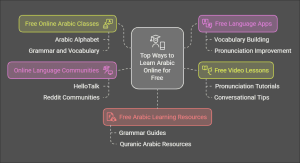Learning Arabic can seem daunting, but thanks to the internet, it’s now easier than ever to get started without spending a dime. Whether you’re a beginner or looking to deepen your skills, free Arabic classes and resources are widely available online. In this guide, we’ll explore practical ways to learn Arabic online for free and provide tips to help you succeed.
Why Learn Arabic?
Arabic is one of the world’s most widely spoken languages, with over 400 million native speakers and immense cultural significance. It’s also the language of the Quran, making it essential for Muslims to connect with their faith. Here’s why learning Arabic is beneficial:
- Understand the Quran: Reading and interpreting the Quran in its original language deepens your spiritual connection.
- Expand Opportunities: Arabic fluency can open doors to careers in translation, teaching, and international relations.
- Appreciate Culture: Learning Arabic helps you explore the rich traditions, history, and literature of Arab countries.
Top Ways to Learn Arabic Online for Free

1. Enroll in Free Online Arabic Classes
Many platforms offer structured online Arabic classes free of charge. These programs are designed to provide a comprehensive learning experience and often include:
- Lessons on the Arabic alphabet, grammar, and vocabulary.
- Interactive exercises to practice reading, writing, and speaking.
- Access to tutors or community forums for guidance.
Examples of free Arabic classes include websites, apps, and even YouTube channels dedicated to teaching Arabic step-by-step.
2. Use Free Language Apps
Language apps like Duolingo, Memrise, and Busuu offer free Arabic courses tailored to beginners and intermediate learners. These apps focus on:
- Vocabulary building with flashcards and games.
- Grammar and sentence structure exercises.
- Audio lessons to improve pronunciation.
3. Watch Free Video Lessons
Platforms like YouTube have a wealth of free Arabic lessons from native speakers and experienced teachers. Channels often include:
- Tutorials on Arabic pronunciation and grammar.
- Quranic Arabic lessons for those learning for religious purposes.
- Conversational Arabic tips for practical communication.
4. Join Online Language Communities
Engage with other learners and native speakers through free online communities like:
- HelloTalk: A language exchange app where you can practice Arabic with native speakers.
- Reddit Language Learning Communities: Subreddits like r/languagelearning and r/learn_arabic provide tips, resources, and support.
5. Access Free Arabic Learning Resources
From e-books to free PDFs, there’s no shortage of learning materials online. Look for:
- Arabic grammar guides and vocab lists.
- Worksheets for practicing Arabic writing.
- Free Quranic Arabic resources for understanding Islamic texts.
How to Maximize Free Arabic Lessons
1. Set Clear Goals
Decide whether you’re learning Arabic for religious, cultural, or professional purposes. This will guide your choice of lessons and resources.
2. Practice Regularly
Dedicate consistent time each day to learning Arabic. Even 15–30 minutes daily can make a difference.
3. Focus on All Skills
Balance your learning by practicing reading, writing, listening, and speaking Arabic. Use a mix of apps, videos, and live practice.
4. Track Your Progress
Keep a journal to track new vocabulary, grammar rules, and achievements. Monitoring progress keeps you motivated.
Affordable Arabic Lessons with The Quran Courses Academy
If you’re ready to take your Arabic learning to the next level, consider enrolling in affordable online classes with The Quran Courses Academy. While free resources are great for starting your journey, structured courses provide a more tailored and effective experience.
- Competitive Pricing: Our programs are designed to be budget-friendly while maintaining the highest quality standards.
- Free Trial Classes: Enjoy two free trial Arabic classes to experience our teaching methods and see if they align with your learning goals.
- Experienced Tutors: Learn from native Arabic speakers certified in teaching both conversational and Quranic Arabic.
- Customized Plans: Lessons are personalized to fit your schedule, skill level, and objectives—whether you’re focusing on grammar, Quran recitation, or conversation.
💻 Ready to begin? Sign up for free Arabic classes with The Quran Courses Academy and take your first step today!
Get started with our Online Arabic Speaking Course and Online Arabic Reading Course.
FAQs About Learning Arabic Online for Free
1. Can I really learn Arabic online for free?
Yes! Many platforms and resources offer free Arabic lessons for beginners and advanced learners alike.
2. Are free Arabic classes as effective as paid ones?
Free classes can be highly effective if you commit to regular practice and use a variety of resources, such as apps, videos, and community forums.
3. How long does it take to learn Arabic?
The time varies based on your goals and effort. Conversational Arabic can take a few months, while mastering Quranic Arabic or fluency may take longer.
4. Are there free online Arabic lessons for kids?
Yes, many platforms, including The Quran Courses Academy, offer online Arabic lessons for kids with interactive and engaging content.
5. Do free Arabic courses include Quranic Arabic?
Some free courses focus specifically on Quranic Arabic, teaching vocabulary, Tajweed rules, and pronunciation for understanding the Quran.
6. What tools do I need for free online Arabic classes?
A computer, tablet, or smartphone with an internet connection is all you need to access free Arabic lessons.
7. Can I learn Arabic grammar online for free?
Absolutely. Many free resources and courses cover Arabic grammar in-depth, helping you build a strong foundation.
8. Are free Arabic classes suitable for adults?
Yes, there are many resources tailored to adult learners, including Arabic classes near me for adults and online programs for various age groups.
9. How can I practice speaking Arabic for free?
Join language exchange communities like HelloTalk or attend free virtual events where Arabic speakers gather.
10. Where can I find free Arabic learning materials?
Check out websites, apps, and forums for free worksheets, PDFs, flashcards, and video tutorials.



